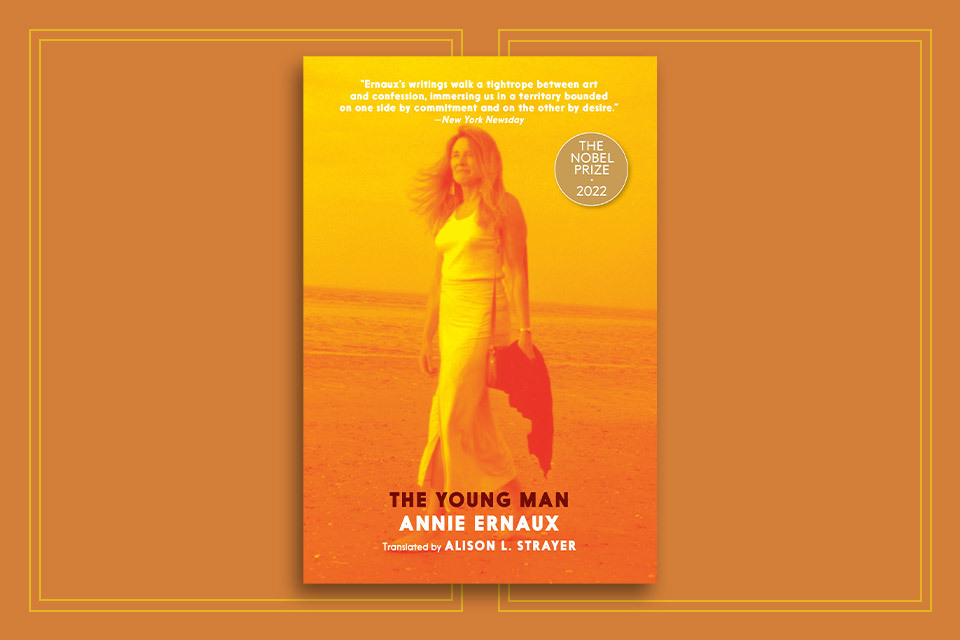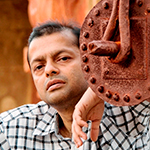Sex, Time, and Memory: Annie Ernaux’s Young Man

The Young Man—forthcoming from Seven Stories in September 2023—is Annie Ernaux’s first novel in English translation after receiving the most coveted honor in literature, the Nobel Prize in Literature, in October 2022 (see WLT’s review of Le Jeune Homme, May 2023, 73). A slim book of autofiction, translated by Alison Strayer, it is a few pages shorter than Simple Passion (1991), her shortest book so far. With deft terseness, Ernaux recounts her short relationship with a student thirty years younger than her. The epigraph reiterates the raison d’être of her writing: living is incomplete without evaluating life’s experiences. Life is spontaneous facticity, spent in accordance with one’s desires and impulses. Writing throws new light on life. It unearths, as Ernaux puts it in The Girl’s Story (2016), something that is irreducible to any singular explanation. In a startling sentence at the beginning of The Young Man, Ernaux equates writing with the need and possibility of overcoming “the fatigue, the dereliction” of sex and the violence of orgasm. She feels writing brings “greater pleasure” than sex, because it doesn’t abandon you to a postcoital void.
It is reminiscent of Roland Barthes’s idea of body-writing in The Pleasure of the Text (1973), of writing as a fragmented overcoming of jouissance. Only literature can aim to retrieve the pieces left behind by pleasure, and its memory. It explains the abrupt style of Ernaux’s autofiction. In lean prose, she moves from description to scrutiny with accuracy. She writes the way the body recalibrates the past.
Ernaux writes the way the body recalibrates the past.
Ernaux takes pleasure in flaunting her relationship with a much younger man in public who arouses curiosity, discomfort, and envy. The feminine and the feminist converge in moments like these. Ernaux takes caustic pride in challenging the gendered gaze that finds it natural for an older man to be seen with a much younger woman but raises eyebrows when the older lover in the relationship is a woman.
She writes, matter-of-factly: “Men have known this forever, and I saw no reason to deprive myself.” Desire is a fact we must learn to embrace without guilt. Ernaux does not miss the normative duplicity behind moral judgment on sexual mores. The abstract question of power in her relationship is broken down to its real, constituent elements.
Ernaux is candidly precise on the aspect of “mutual gain” in the relationship: The young man made her feel what she wouldn’t have “imagined experiencing again.” She took him for trips and took care of his expenses to ensure he spent time with her. She also taught his restless youth, caught up in professional chores, the “slow-motion satisfaction of desire . . . a sort of continuous creation.” The logic of profiting from pleasure includes and involves the act of giving the most artful part of oneself. Slow intimacy expands the horizon of desire. It makes possible the assiduous ease with which older people would like to explore pleasure.
Slow intimacy expands the horizon of desire.
Ernaux lays out the paradox with unsentimental honesty: “I was in a dominant position, and I used the weapons of that dominance, whose fragility, in a romantic relationship, I nonetheless recognized.” She makes no bones about using her power to her advantage, but she also realizes the vulnerability of that power. She had earlier experienced the cold demeanor of an older man in The Girl Story. With Mr. S, the Russian diplomat in Getting Lost (2001), she lived through the precarious travail of what Barthes calls the “lover’s fatal identity”: the person who waits. It leaves her so desperately vulnerable that she feels unable to draw solace from the Proustian reassurance that human will has the ability “to pass through suffering.” In The Young Man, Ernaux considerately uses her power with the student.
A leitmotif in the book is Ernaux’s constant awareness of the concentric circles of memory. The student lived in the city of Rouen, where Ernaux spent her sixties. He brought back memories of hearing Jim Morrison. The hospital close to the Hôtel-Dieu, which the man’s apartment looked out on, was the place where she was admitted after her postabortion hemorrhage. When she visits Venice with him, she thinks of the man she went there with in 1963, and when she met a young Italian man in 1990. Ernaux writes, “I felt as if I were reenacting scenes and actions already past—from the play of my youth.”
It is reminiscent of Milan Kundera exploring the metaphorical idea of astrology in Immortality (1988), which he calls the “dial of life”: the configuration of stars at birth that orchestrate your life’s cyclic theme like that of a clock where, Kundera writes, “what will seem to you at first ‘a new life’ will soon turn out to be just a variation of your old existence.”
Ernaux merges these circles in a striking line: “I felt as if I had been lying on a bed since age eighteen and never risen from it—the same bed but in different places, with different men, indistinguishable from one another.” Lovers are phantoms who enact variations of the same script on an identical stage. The unique distinctions of subjectivity disappear in the fusion of images. Experience is a blur of gestures and sensations. Memory is the hieroglyphics of desire.
Lovers are phantoms who enact variations of the same script on an identical stage.
In Ernaux’s words, the travel by design to an earlier moment of loss to probably seek a moment of reclamation is an “astonishing, almost uncanny coincidence, a sign of a mysterious encounter.” This phenomenon, in André Breton’s famous phrase in Mad Love (1937), is “objective chance,” where the mysterious forces of desire are seen to dictate life’s serendipitous experiences and discoveries. Breton’s surrealist writings made an influence on Ernaux in her formative years. Ernaux marks her secret acknowledgment of Breton in Getting Lost when she writes: “Objective chance has lit my path with its dazzling light again.” It marks her thirst for the newness of experience.
The word “uncanny” alludes to Freud’s “repetition compulsion”: returning to a moment of pain, or loss, as a mark of original distress. The awareness of reclaiming, or recovering time past does not heal but intensifies the inadequacy and loss of that moment etched in time. In the middle of describing her relationship, Ernaux writes that the present is “only a duplicate of the past” the student helps her revisit. Repetition is an obsessive act of duplication. It is a return to the origin of loss, and Ernaux is conscious of the materiality of that loss. Loss isn’t reflected simply in the folds of memory but in the folds of the body. When she shows her young lover photos of her younger self, she becomes aware that her youthfulness will “always elude him.” Her face, she writes, is now “harder and more gaunt.” There is no trace of sentimentality in Ernaux’s realization of her aging, as in most other things. The signs of aging are a matter of curiosity, made possible through the invention of photography. If the body is time, photography is a window to time past. It offers an aching reminder to the fleeting charms of youth.
Ernaux has lived a life that she called “palimpsest time” in Getting Lost. In this book, she attributes to her young lover the distinction of turning her life into a “never-ending palimpsest.” A rich metaphor of superimposition and erasure, the palimpsest cradles the shaky ground of our fragile subjectivity. It puts into question the certainties of rationalist constructs in narratives of selfhood. For Ernaux, The Young Man, in a nutshell, is a love story where “sex, time, and memory were intertwined.” It is a story that compels us to revisit our own past, and to wonder if we share Ernaux’s unflinching clarity about recognizing the dial of life.
New Delhi















